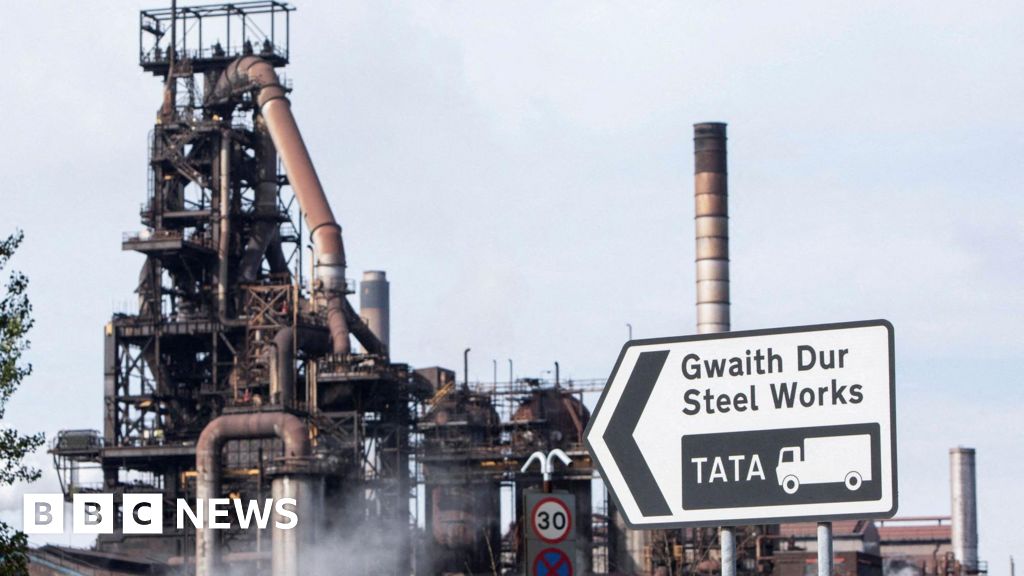Ministers are preparing to announce that an agreement has been reached to give Tata Steel a grant of £500m towards the cost of its electric arc furnace.
Union sources say the agreement comes with assurances over future investments, including the potential to build a steel plate facility in Port Talbot for floating offshore wind turbines.
The previous Conservative government had agreed in principle to give Tata Steel the £500m grant towards the £1.25bn electric furnace, which will melt scrap steel.
Labour had pledged to honour the agreement during the election campaign, and will confirm the plan in the Commons on Wednesday.
Tata Steel has begun winding down its blast furnace operations in Port Talbot, with the second of two furances due to close at the end of September.
About 2,500 workers are set to be made redundant, with a further 300 expected to be made redundant in future.
While Labour had pledged to honour the £500m grant agreed by the Conservatives, it has also committed £2.5bn towards the future of steelmaking.
Ministers have been speaking to unions and Tata Steel about further commitments which would maintain steel production in south Wales.
It follows a memorandum of understanding (MoU) that has been reached between the unions and Tata Steel.
The MoU includes a commitment from the company to consider future investments in new steel plate technology and to fully support its other Welsh sites in areas like Llanwern, Trostre and Shotton.
There are also calls for some of the £2.5bn steel fund to be spent on subsidising energy costs.
UK Steel director general Gareth Stace said the government should make “competitively priced electricity” available to companies such as Tata Steel.
The UK government said it had a scheme for reducing energy prices for steelmakers, and had committed £2.5bn to support the industry.
“As the steel sector in the UK moves to fully electric arc furnace, and therefore using an enormous amount of electricity, having competitively priced electricity is critical to the success of our future,” said Mr Stace.
He said the government should use some of its £2.5bn fund to drive down the cost of electricity for steel producers.
“What we’re asking for here is not the cheapest in the world, but we want our electricity prices to be the same as they are in France and Germany, where our main competitors are,” Mr Stace added.
UK Steel also wants the government to buy more steel from the UK for major projects and reduce its use of imported steel. The organisation, whose members include the major steel producers, also wants commitments from ministers about future investments in new steel facilities.
A Department for Business and Trade spokesperson said: “We are already bringing energy costs for important UK industries like steel closer in line with other major economies through the British Industry Supercharger, which will see them remain competitive on the world stage. And through Great British Energy this government is speeding up the transition towards cheaper, homegrown clean power.
“We’re also working in partnership with trade unions and businesses to secure a green steel transition that’s right for the workforce and safeguards the future of the steel industry in Britain. We’ve committed to £2.5 billion of investment to rebuild the UK steel industry and support communities for generations to come.”
Tata Steel, trade unions and Labour politicians have all called for government support to build the technology that would allow steel plate for wind turbines to be produced in south Wales.
Welsh Conservatives said Labour had “come to its senses” and the best deal remained that negotiated by the previous Tory UK government.
Shadow Welsh Secretary, Lord Davies of Gower said: “I urge the Labour UK government to now turn its attention quickly to ensuring financial aid reaches the affected workers without any delay.”
Mr Stace said: “For us to be able to supply the future offshore wind sector in the UK, we probably need a wide gage heavy plate mill in the UK.
“Now, that will cost a few hundred million pounds, but we want to get it right. So we need to sit down with government and work out where that investment is best spent.”

